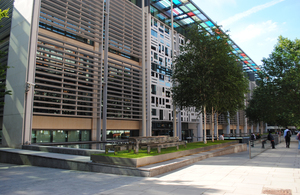More synthetic opioids banned to protect communities
Fifteen additional synthetic opioids are now under the strictest controls to prevent drug related deaths and ensure anyone caught supplying them faces tough penalties.

Fifteen additional synthetic opioids are now under the strictest controls, in line with fentanyl, to prevent drug related deaths in the UK and ensure anyone caught supplying these substances faces tough penalties.
From today, 15 additional synthetic opioids, including 14 nitazenes, are now controlled as Class A drugs under the Misuse of Drugs Act 1971, following advice from the Advisory Council on the Misuse of Drugs (ACMD).
Many of these substances are highly addictive and incredibly dangerous and pose a higher risk of accidental overdose – a widespread problem in other countries. Placing them under the strictest controls is a clear message to anyone involved in production or supply of these drugs that they will face the full force of the law – including up to life in prison, an unlimited fine, or both.
The government’s priority is to engage with vulnerable people at risk of being sold these lethal drugs and divert them towards treatment; however, those caught in possession of them could also face up to seven years imprisonment, an unlimited fine or both.
Our laws will be future proofed by introducing a generic definition of nitazenes, to capture any new drugs that emerge in future.
Home Secretary James Cleverly said:
We are highly alert to the threat from synthetic drugs and have been taking a range of preventative action, learning from experiences around the globe, to keep these vile drugs off our streets.
Our plan is working – the overall quantities of synthetic opioids reaching the UK remain lower than other countries, but we are not complacent. Placing these toxic drugs under the strictest controls sends a clear message that the consequences for peddling them will be severe.
Crime and Policing Minister Chris Philp said:
Synthetic opioids are significantly more toxic than heroin and have led to thousands of deaths overseas. We are determined to ensure these destructive and lethal drugs do not take hold in our communities in the UK.
We have a strategy that is tackling the soulless criminal networks supplying these drugs and are building a world class treatment system to turn lives around. We are enhancing our early warning system to ensure the right agencies can respond rapidly if these drugs are detected in communities.
The UK is enhancing its surveillance and early warning system, which will improve the ability to track dangerous narcotics that reach our streets. This was first outlined last week in Vienna at the United Nation’s annual Commission on Narcotic Drugs by the Crime and Policing Minister.
This will include state-of-the-art monitoring for the presence of synthetic drugs by analysing wastewater or recording spikes in overdoses in specific locations. These findings will be cascaded down to law enforcement and public health agencies, at national and local level, meaning rapid action can be taken in communities where they are detected.
At the conference, the Policing Minister met US Secretary of State Anthony Blinken where the two leaders pledged for both countries to work together to tackle the synthetic opioids threat, including agreeing the need for international action against nitazenes.
The UK is a long-standing funding contributor to the UN’s early warning advisory system and also joined the US-led Global Coalition to Address Synthetic Drugs.
The fifteen new synthetic opioids which have been made Class A drugs under the Misuse of Drugs Act 1971:
- Metonitazene
- Protonitazene
- Isotonitazene
- Butonitazene
- Flunitazene
- Metodesnitazene (metazene)
- Etodesnitazene (etazene)
- N-Pyrrolidino-etonitazene (Etonitazepyne)
- N-Piperidinyl-etonitazene (Etonitazepipne)
- N-Pyrrolidino Protonitazene
- Ethyleneoxynitazene
- N-Desethyl protonitazene
- N-Desethylisotonitazene
- N-Desethyl-etonitazene
- Brorphine
Five other drugs have also been banned today, including 3 stimulants - diphenidine, ephenidine and methoxyphenidine- which create similar effects to ketamine. These can cause complications such as seizures and liver failure and are now controlled as Class B drugs.
A synthetic cannabinoid receptor agonist (SCRA) called cumyl-PeGaClone has also been controlled as a Class B drug and a short-acting benzodiazepine drug named remimazolam is now Class C.
The government’s 10-year Drug Strategy is supported by nearly £900 million of additional investment during 2022 to 2025, of which the largest amount, £780 million, is dedicated additional funding for the treatment and recovery system.
We have already increased the number of people in drug and alcohol treatment by over 21,000, recruited 1,694 drug and alcohol workers and are expanding the availability of life saving Naloxone to prevent more tragic deaths.
Since April 2022, we have also closed over 2,500 county lines and delivered over 6,000 major and moderate organised crime group disruptions.